Dorsal root ganglion drg - Study guides, Class notes & Summaries
Looking for the best study guides, study notes and summaries about Dorsal root ganglion drg? On this page you'll find 48 study documents about Dorsal root ganglion drg.
Page 2 out of 48 results
Sort by
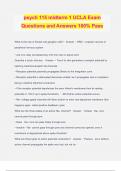
-
psych 115 midterm 1 UCLA Exam Questions and Answers 100% Pass
- Exam (elaborations) • 20 pages • 2024
- Available in package deal
-
- $12.49
- + learn more
psych 115 midterm 1 UCLA Exam Questions and Answers 100% Pass What is the role of Dorsal root ganglion cells? - Answer- • DRG = unipolar neurons in peripheral nervous system • Job is to relay somatosensory info from skin to spinal cord Describe a touch stimulus. - Answer- • Touch to skin generates a receptor potential by opening mechanoreceptor Na channels • Receptor potential passively propagates (flows) to the integration zone • Receptor potential is attenuated (becomes small...
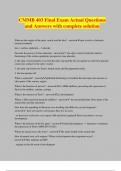
-
CMMB 403 Final Exam Actual Questions and Answers with complete solution
- Exam (elaborations) • 34 pages • 2024
- Available in package deal
-
- $7.99
- + learn more
CMMB 403 Final Exam Actual Questions and Answers with complete solution What are the origins of the optic vesicle and the lens? - answeroptic vesicle = forebrain (neural ectoderm) lens = surface epidermis --> placode Describe the process of lens induction - answer1. the optic vesicle (forebrain) induces thickening of the surface epidermis (prospective lens placode) 2. the optic vesicle pinches in to form the optic cup and the lens invaginate as well (lens placode comes into contact w/...
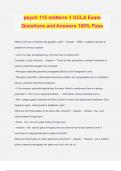
-
psych 115 midterm 1 UCLA Exam Questions and Answers 100% Pass
- Exam (elaborations) • 20 pages • 2024
- Available in package deal
-
- $12.49
- + learn more
psych 115 midterm 1 UCLA Exam Questions and Answers 100% Pass What is the role of Dorsal root ganglion cells? - Answer- • DRG = unipolar neurons in peripheral nervous system • Job is to relay somatosensory info from skin to spinal cord Describe a touch stimulus. - Answer- • Touch to skin generates a receptor potential by opening mechanoreceptor Na channels • Receptor potential passively propagates (flows) to the integration zone • Receptor potential is attenuated (becomes small...
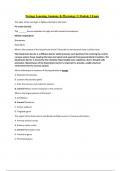
-
Portage Learning Anatomy & Physiology 2: Module 2 Exam
- Exam (elaborations) • 7 pages • 2024
-
Available in package deal
-
- $9.49
- + learn more
Portage Learning Anatomy & Physiology 2: Module 2 Exam This layer of the meninges is tightly attached to the brain. Pia mater (menix) The _______ fissure separates the right and left cerebral hemispheres. Median longitudinal Brainpower Read More What is the purpose of the blood-brain barrier? Describe its maintenance from a cellular level. The blood-brain barrier is a diffusion barrier which prevents most particles from entering the central nervous system tissue, keeping the br...
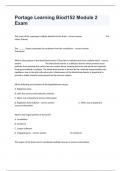
-
Portage Learning Biod152 Module 2 Exam Questions And Detailed Correct Verified Answers.
- Exam (elaborations) • 7 pages • 2024
-
Available in package deal
-
- $12.99
- + learn more
This Layer of the meninges is tightly attached to the brain - correct answer Pia Mater (Menix) The ______ fissure separates the cerebrum from the cerebellum. - correct answer Transverse What is the purpose of the blood-brain barrier? Describe its maintenance from a cellular level. - correct answer The blood-brain barrier is a diffusion barrier which p...
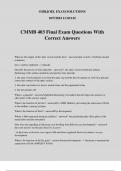
-
CMMB 403 Final Exam Questions With Correct Answer
- Exam (elaborations) • 37 pages • 2024
-
- $11.49
- + learn more
CMMB 403 Final Exam Questions With Correct Answers What are the origins of the optic vesicle and the lens? - answeroptic vesicle = forebrain (neural ectoderm) lens = surface epidermis --> placode Describe the process of lens induction - answer1. the optic vesicle (forebrain) induces thickening of the surface epidermis (prospective lens placode) 2. the optic vesicle pinches in to form the optic cup and the lens invaginate as well (lens placode comes into contact w/ the optic vesicle) ...
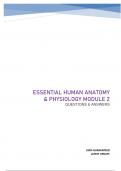
-
ESSENTIAL HUMAN ANATOMY & PHYSIOLOGY MODULE 2 QUESTIONS & ANSWERS
- Summary • 20 pages • 2023
-
- $17.74
- + learn more
ESSENTIAL HUMAN ANATOMY & PHYSIOLOGY MODULE 2 QUESTIONS & ANSWERS 100% GUARANTEED LATEST UPDATE Pia mater (menix) This layer of the meninges is tightly attached to the brain. Your Answer: Pia Mater Question 1 3 / 3 pts Median longitudinal The fissure separates the right and left cerebral hemispheres. Your Answer: Median Longitudinal Question 2 3 / 3 pts Score for this quiz: 100 out of 100 All the following are functions of the hypothalamus except: Maintain homeostasis ...
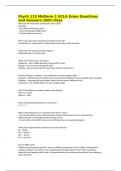
-
Psych 115 Midterm 1 UCLA Exam Questions and Answers 100% Pass
- Exam (elaborations) • 13 pages • 2024
- Available in package deal
-
- $10.50
- + learn more
Psych 115 Midterm 1 UCLA Exam Questions and Answers 100% Pass What are the three layers of protective layer called? Meninges - Dura Mater (thick outer layer) - Arachnoid (Spongy middle layer) - Pia Mater (thin inner layer) What is the organ that constantly manufactures the CSF? choroid plexus, which resides in hollow tubes and cavities called ventricles Where does the action potential originate? Integration zone (or active zone) What are the three types of neurons? Multipo...
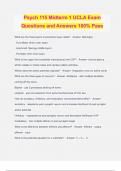
-
Psych 115 Midterm 1 UCLA Exam Questions and Answers 100% Pass
- Exam (elaborations) • 23 pages • 2024
- Available in package deal
-
- $12.49
- + learn more
Psych 115 Midterm 1 UCLA Exam Questions and Answers 100% Pass What are the three layers of protective layer called? - Answer- Meninges - Dura Mater (thick outer layer) - Arachnoid (Spongy middle layer) - Pia Mater (thin inner layer) What is the organ that constantly manufactures the CSF? - Answer- choroid plexus, which resides in hollow tubes and cavities called ventricles Where does the action potential originate? - Answer- Integration zone (or active zone) What are the three types of ...
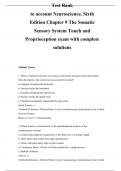
-
Neuroscience, Sixth Edition Chapter 9 The Somatic Sensory System Touch and Proprioception exam with
- Exam (elaborations) • 37 pages • 2024
-
Available in package deal
-
- $10.99
- + learn more
Multiple Choice 1. Where would the cell body of a sensory neuron that transmits touch information from the cheek to the central nervous system be located? a. Ganglion alongside the brainstem b. Nucleus inside the brainstem c. Ganglion alongside the spinal cord d. Nucleus inside the spinal cord e. Ganglion immediately underneath the skin of the cheek Answer: a Textbook Reference: Afferent Fibers Convey Somatosensory Information to the Central Nervous System Bloom’s Level: 2. Understan...

Do you wonder why so many students wear nice clothes, have money to spare and enjoy tons of free time? Well, they sell on Stuvia! Imagine your study notes being downloaded a dozen times for $15 each. Every. Single. Day. Discover all about earning on Stuvia


